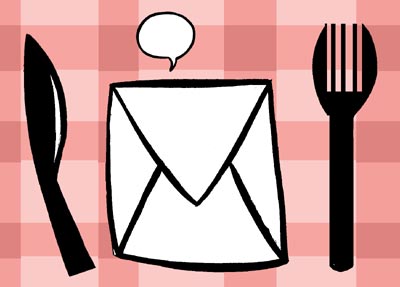
It is not competence and hard work alone that makes you succeed. Your conduct matters much more than you give it credit for. Read on to demystify some rules in office communication.
Just the other day, Rajiv Singh, marketing head of Knowserv, a headhunter firm, received a resume in response to job advertisement he had put for an automobile manufacturing client.
This was for recruiting fresh marketing executives. The candidate's e- mail started with: "Hi Rajiv" and went on to describe: "I am Sujit. Wud be interested in applyin' for the required position. CV's attached." Cheerio, Sujit R."
Rajiv trashed the email. In fact he sifted all "cool" sounding resumes as this and short-listed the traditional or what he terms as "sane" applications.
Whether it comes to writing a business email or following fundamental business etiquettes, a lot of youngsters like Sujit are untrained, hence losing out on good job opportunities.
While emails are digital versions of your personality, your conduct within the office freezes your image-type.
But what really is etiquette? Using colloquial language with your boss is fine? A friendly back pat to your American colleague is okay?
"Etiquette means knowing what you should not do," Nikhil Indrasenan, Head, Training, Ma Foi Randstand gives a simple definition, adding, " and knowing what you should do."
Should you say a hello first and leave handshakes for the end or vice versa?
Well, in most situations it is a "sensory" call, meaning, you trust your senses and go with the flow so that your act doesn't seem programmed or staged.
Says Nikhil, "Etiquettes are not practised in silos. It cannot be learned in theory."
Etiquettes are highly culturally-driven too, what may be acceptable in one culture may not be tolerated in another. But, by and large there are a few accepted elementary rules, which anyone can follow easily.
Illustration: Uttam Ghosh
ALSO READ: 'Indians speak too fast, too loud and do not listen'
Please click NEXT to continue reading

If you are making a business call, be courteous.
Introduce yourself and keep your conversation short. Managers and CEOs will not be kind to your drag of: "Is this Mr. Dayal? Sir, actually, I am calling to invite you to speak. Sir, actually, we are having a conference and we want you to speak as a guest speaker."
Even the most flattered CEO is unlikely to think of you as a professional. Reasons: No self-introduction, bad language formation, a dragging tone.
Overall your image sums up as: "a diffident personality," and "hence no value add to me".
Professionals keep their tone pepped up, cheery and neutral with no extra flab of words. Shun unnecessary words like "Actually, Ummm, Sir".
Smoothly but sure-footedly, slide in to the point. Address the person, preferably, as Mr. Khan or Mr. Sharma instead of Sir. This will keep your motivation levels up as well.
Before you call, practise in your head so that you start and end the call without stammering or fumbling for words. It is equally important to end your call as gracefully as you have started it.
A limp "Tha.. Thanks Sir," will undo all your initial efforts.
As a caller, many professionals are inflicted by the politeness of: "Is this a good time to speak?"
Here's what a blue–blooded professional interprets of this overstated civility: Yes miss/mister, Otherwise, I wouldn't have bothered to take your call. Use this courtesy, only when you genuinely sense the need of it, not as a matter of rule.
Also remember that when professionals take your call it doesn't mean he is giving you the permission to talk endlessly.
Conversation will flow smoothly if the other person is also interested. If the person at the other end is replying in monotones and you sense the disengagement wrap the call up.
One peculiar trait that professionals should excuse themselves forever is to dole out 10 missed calls in 2 minutes. This kind of desperation is seriously unprofessional.
In email, it is acceptable to send and receive mail any time of the hour, so you can shoot mails at your convenience but the same protocol does not apply when reaching out through phone call.
Illustration: Uttam Ghosh

Even while you are text messaging, be mindful of the time.
A text at 9 p.m. is better than a call but a text message at 2 a.m is a big No. At all times, keep smses precise, courteous, with proper introduction and sign off.
"Good morning Mr. Bindra", closing with "Regards". Unless of course, you have bandied 2-3 smses and Regards seem out of place.
We are still some place between accepting and forging a new sms style.
While some may get put off receiving your message: "dat is hw we cn arnge it 2". Others may be more agreeable to: "That is how we can arrange it too."
While you diligently assess who to reach out with which style, keep the latter as a norm when you are texting senior professionals.
As a receiver, following courtesy is equally important.
A professional will always politely return the greeting. If he is unable to take the call, and will say no without rudeness creeping in, instead of just turning the phone off.
Illustration: Uttam Ghosh

Emails are now legally accepted piece of document, so better mind the language you are using.
Loose statements, bad language, false projections and claims are a big No.
Emails when used for business purposes, for starters, should have a subject line and that too a relevant one.
Don't use " Hello" or "Hi" as subject, instead, have a concise and unambiguous line that tightly summarises your following content.
For example, as an IT vendor if you are reaching out to your prospective customer for renewing the AMC then state that clearly. "Request for renewal of your AMC".
If you mention "Computer AMC" do at the risk of sounding generic and getting waylaid in Spam section.
Business emails should have a netural "tone" and should be relevant to the core. Avoid getting friendly and embarking on too conversational a style.
How do you address the person? "Respected David" or "Dear David Sir" or " Dear David Cradden" ? Avoid all three.
"Dear Mr. Cradden" will do just fine.
Give an appropriate closure to your email. Move over from "Yours Obediently", "Yours Faithfully" to adopt "Regards", or "Sincerely"
Signing off just by first name or initials is not okay. Have a signature with full name, title, organisation address and numbers on which you can be contacted.
What is an ideal email length? Safely, professionals keep it precise enough to convey the message without getting into a spiel.
If the content needs scroll after scroll to read, it loses its mark. Sensible executives will prioritise and summarise the content putting rest of the conversation in an attachment.
Primary recipients of the mail should be marked "To". Others who are under the category of " for their information" should be under CC. BCC should be used when you don't want the other recipients to know that you have sent that mail to others.
Illustration: Dominic Xavier

Barging into your colleague's desk to narrate vacation stories may be a trend tolerated in yesteryears, but not now.
As Western style professionalism is being embraced, there is no room for such intrusive conducts.
Culturally, notion of privacy may differ but it makes good business sense to follow international etiquettes on privacy issues.
The matter will acquire getter relevance as offices become ethnically integrated workplaces.
Professionals don't like any one to be darting in and be privy to sensitive and propriety data they are working on.
Peeking into other's computer, fiddling with other's phone, sneaking a glance at text messages are all inappropriate behaviour.
Privacy also means giving professional space to an executive. Check out if your colleague or your boss likes to get disturbed in early hours of work, from 9: 30 to 11: 30 a.m. It's a sure bet that they won't. So, get on with your work too, rather than being annoyingly intrusive in those hours or aimlessly loitering from one work station to another.
Privacy also takes into account physical distance. Maintaining an appropriate distance with a female colleague, avoiding back pat to a colleague, are privacy etiquettes.
"An 18-inch space is individual's space one should not set foot in it," cautions Nikhil.
But again there are no iron cast rules, he says If the speaker is a soft spoken person, you may like to nudge a bit closer in an effort to hear him/her.
At global workplace, privacy also means talk on following topics off-limits: salary package, financial transactions/property/jewellery/stock market activities, romantic life, sexual, religious and political orientation, waist size among other things.
In fact, is best to let some topics evolve naturally without forcing them.
Illustration: Uttam Ghosh

One's tone accounts for 38 percent of communication where as body language accounts for 55. Words account for a mere 7 percent.
Can you imagine how much of a difference voice tone can bring in changing or altering the meaning of the message.
"Would you mind joining the meeting?".
Try this sentence with different tones and at different times, an emphasis on different words. Loud doesn't mean you are right, a sensible professional knows that.
It is also the tendency of freshers, young professionals that they, in their enthusiasm, that they start rattling incoherently in the meetings.
Watch out the speed of speech, says Nikhil. Gobbled up words, jumping sentences cannot get your message across. 120-180 words per minute is the accepted norm.
Voice is about influencing; it actually reflects the degree of confidence. Nikhil is of the view that if one has to work on a right vocal variety, one must watch a good speaker.
A seasoned speaker emphasises on certain words, energises his audiences by talking faster or sailing in to pauses. They vary volume for effectiveness, synchronising pace with pitch, volume, articulation, pronunciation, facial expressions and overall body language.
Well, body language conveys way lot more about you than you can conceive.
One executive may be intimidating the other with his overbearing body language ; thrusting the chest forward, thumping table now and then, shoving hands in pockets or placing them akimbo, tapping the foot; whatever body language one allows oneself, professionals make sure they don't defeat the purpose of conversation.
Illustration: Uttam Ghosh

If you are delivering a presentation to your boss, is it fine to dive straightaway into sales figures, accomplishments or issues? It feels awkward, right?
Whether you are using small talk as a prelude to serious business conversations or to break ice with a new employee, remember that small talk has acquired stature of soft skill etiquette.
Try to be light, positive, non-intrusive and neutral in your initiative. For instance, "Rafa played cracker of a match yesterday," or "How was your weekend?"
Starting off about Tedulkar's performance to a non-cricket female colleague or boss will fall out of line. For all you know, her interest area could be fluctuations of stock market.
Safe bet: Start with generally likeable topics such music or films. Don't descend into probing questions in a bid to break the ice.
Like all other soft skills, grooming in this area is also necessary because in business market the value of small talk is getting high.
Business degrees may or may not teach you about these communication skills in the classroom but the rapport and networking you develop via this channel will contribute to your successful career.
Youngsters should first observe and then approach as etiquettes vary in different setting, advises Nikhil.
Is appraisal time nearing? Then let that be the motivation to replace your usual "yeah" to "yes" with your boss.
Illustration: Uttam Ghosh